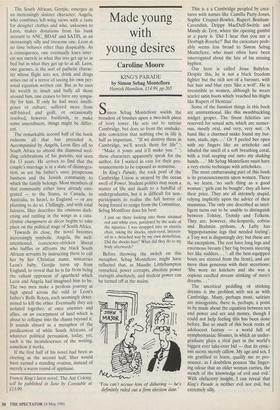South African Queen
Francis King
THE INDOOR BOY by Anthony Sher Chatto, f13.99, pp. 277 Antony Sher has given a number of fine performances but none finer than as that greatest of all theatrical monsters, Richard III. In The Indoor Boy he is imper- sonating another monster. Like his creator, Leon Lipschitz is Jewish, homosexual and a white South African living in London. Unlike his creator, with his remarkable energy and self-discipline as actor, author and painter, he is also a slob.
The first half of Sher's novel is taken up with establishing, graphically but at an inordinate length, the nature and extent of that slobbery. Son of a hugely rich father, Leon squanders money on drink and cocaine. Although married to an English schoolmistress, Angela, he also pursues a frenetic gay life, making casual pick-ups and entertaining rent-boys in the marital home. Eating in restaurants, he tends either to insult the waiters or to touch them up.
Many gay men are married, and many married men have occasional gay experi- ences. What is difficult to believe about Leon is that his straight and gay cravings so often overlap, so that on the same day we find him drooling over the size both of Angela's breasts and of a passer-by's dick. What is also difficult to believe is that someone so often stoned should be able to make a perpetual sexual orgy out of his existence.
Since there is so much sex in Leon's life, there is a lot of it in this first half of the novel, accompanied by such sounds as ToomF!', `WHONIC!' and `Goosi-i!' These extended descriptions of Leon performing with Angela, with a rent-boy, or with Angela and a South African youth, first met in the offices of South African Airways, at one and the same time, display a stylistic virtuosity to match Leon's virtu- osity as a lover; but, for all their explicit- ness, they remain strangely unerotic. Leon himself is the narrator, with a penchant for ungrammatical structures like 'Me and Angela decided. . . ' and for words, bewil- dering to the average English reader, like klup, klomp, kak, kvetsh, schmo, shlonger, schlurp, shtum, shnozz. The South African, Gertjie, emerges as an increasingly sinister character; Angela, who combines left-wing views with a taste for designer clothes and who, unknown to Leon, makes donations from his bank account to ANC, BDAF and SATIS, as an increasingly silly and tiresome one. Leon at no time behaves other than despicably. As a consequence, one eventually loses inter- est not merely in what this trio get up to in bed but in what they get up to at all. Leon, one guesses, is the sort of pathetic charac- ter whose flight into sex, drink and drugs arises out of a terror of seeing his own per- sonal equation written out. But as he uses his wealth to insult and bully all those around him, one ceases to have any sympa- thy for him. If only he had more intelli- gence or culture, suffered more from self-hatred and guilt, or occasionally resolved, however fruitlessly, to make some amendment, things might be differ- ent.
The remarkable second half of the book redeems all that has preceded it. Accompanied by Angela, Leon flies off to South Africa to attend the diamond wed- ding celebrations of his parents, not seen for 13 years. He arrives to find that the couple's marriage is in a state of disintegra- tion, as are his father's once prosperous business and the Jewish community to which the family belongs. Most members of that community either have already emi- grated — to the States, to Canada, to Australia, to Israel, to England — or are planning to do so. Chillingly, and with total fairness, Sher describes the ominous dark- ening and rattling in the wings as a cata- clysmic changement de decor begins to take place on the political stage of South Africa. Towards its close, the novel becomes increasingly symbolic. Angela, the well- intentioned, conscience-stricken liberal who baffles or affronts the black South African servants by instructing them to call her by her Christian name, miscarries Leon's baby. Gertjie turns up from England, to reveal that he is far from being the valiant opponent of apartheid which Leon and Angela had imagined him to be. The two men make a perilous journey at high speed across the veld in Leon's father's Rolls Royce, each seemingly deter- mined to kill the other. Eventually they are isolated together, at once enemies and allies, on an escarpment of land which is about to collapse into the chasm beyond it. It sounds absurd as a metaphor of the predicament of white South Africans, of whatever political persuasion, today; yet, such is the incandescence of the writing, somehow it works.
If the first half of his novel had been as riveting as the second half, Sher would have earned a standing ovation, instead of merely a warm round of applause.
Francis King's latest novel, The Ant Colony, will be published in June by Constable at £13.99.



























































 Previous page
Previous page